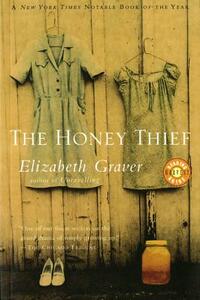Take a photo of a barcode or cover
I thought I'd enjoy this one more then I did! I was laboring under the impression it was going to be similar to "The Secret Life of Bees" and it just wasn't. The characters were pretty one dimensional and the ending was abrupt to say the least!
I felt that this book was just alright, I would like to give this book a 2 1/2. Nothing really awful to saw about it, yet nothing really great to say about it either. When the plot of a novel is slow (like this one), I expect greater character development and emotions. Instead I just felt passive towards all the characters.
I did not understand Burl's role in this book. Was he supposed to bring them (mother-daughter) closer together, help Eva with her stealing, teach her life lessons or what? I kept expecting Burl and Miriam to get together or at least become close friends, but that never happens. And the end, it just ends--no real conclusions, not even a direction.
I think I would have liked this book more if it focused more on the relationship between Eva and Miriam and Eva and Burl. Instead there are a lot of flashbacks with Burl and his parents and his love Alice. And then Miriam's flashbacks all involve Francis. While I thought these flashbacks, especially with Francis, were interesting, I felt the novel spent too much time in the past, and too little in the present and future. For example, the "tensions" between Eva and Miriam are only really talked about in one scene, when Miriam is on her way to work and they get into a huge argument.
I did not understand Burl's role in this book. Was he supposed to bring them (mother-daughter) closer together, help Eva with her stealing, teach her life lessons or what? I kept expecting Burl and Miriam to get together or at least become close friends, but that never happens. And the end, it just ends--no real conclusions, not even a direction.
I think I would have liked this book more if it focused more on the relationship between Eva and Miriam and Eva and Burl. Instead there are a lot of flashbacks with Burl and his parents and his love Alice. And then Miriam's flashbacks all involve Francis. While I thought these flashbacks, especially with Francis, were interesting, I felt the novel spent too much time in the past, and too little in the present and future. For example, the "tensions" between Eva and Miriam are only really talked about in one scene, when Miriam is on her way to work and they get into a huge argument.
challenging
dark
emotional
informative
reflective
sad
tense
slow-paced
Plot or Character Driven:
Character
Strong character development:
Complicated
Loveable characters:
Yes
Diverse cast of characters:
Yes
Flaws of characters a main focus:
Complicated
This book is empowering.
There's this deep emotional sympathy when reading.
With bipolar being the main subject of the book, it gives you a glimpses into a different state of mind.
There's a lot to unpack in this novel. Definitely a must read.
There's this deep emotional sympathy when reading.
With bipolar being the main subject of the book, it gives you a glimpses into a different state of mind.
There's a lot to unpack in this novel. Definitely a must read.
I feel like this book had so much potential and this author had a really great story to tell...but, she didn't quite tell it.
I reached the end of the book and had to sit back and think about the story (not a bad thing). the problem with this is that there was no resolution. Sure, the main character had a problem and then she overcame it, but the reader was not part of this transformation.
I feel like the author had all of the strings to this plot tightly in her hands, but she never found the right way to weave together the mother/daughter, bee/society, or sexuality/familial relations. As a reader I was left wanting more, but feeling like the door had been closed on my curious face.
Overall disappointing, sad face.
I reached the end of the book and had to sit back and think about the story (not a bad thing). the problem with this is that there was no resolution. Sure, the main character had a problem and then she overcame it, but the reader was not part of this transformation.
I feel like the author had all of the strings to this plot tightly in her hands, but she never found the right way to weave together the mother/daughter, bee/society, or sexuality/familial relations. As a reader I was left wanting more, but feeling like the door had been closed on my curious face.
Overall disappointing, sad face.
Life is messy, growing up is hard and no one really knows anyone - not really - in the end.
I thought I'd enjoy this one more then I did! I was laboring under the impression it was going to be similar to "The Secret Life of Bees" and it just wasn't. The characters were pretty one dimensional and the ending was abrupt to say the least!
I loved the slow pace of this book. The way when reading it i felt sun drenched and full of angst stuck in the country as a teenager...pulling against all that wide empty space around me.....
A mom and her daughter
move to the country to
avert the troubled path
the daughter has begun
to travel. There, the
daughter is befriended by
a beekeeper. Some disconcerting
and seemingly unnecessary scenes.
move to the country to
avert the troubled path
the daughter has begun
to travel. There, the
daughter is befriended by
a beekeeper. Some disconcerting
and seemingly unnecessary scenes.
Elizabeth Graver, The Honey Thief (Hyperion, 1999)
There is quite a difference between the novel where nothing happens at all and the minimal novel, where small things happen, but due to the lack of bigger things happening around them, the small things take on a significance they would not otherwise normally have. There are far too many examples of the former type to list; Elizabeth Graver's fine novel The Honey Thief is an excellent example of the latter.
Sick of New York City, widowed paralegal Miriam Baruch takes her eleven-year-old daughter Eva out to Finger Lakes country for a bit of rest, relaxation, and rehab; Eva has developed a rather nasty habit of stealing things. Eva develops a relationship with a local beekeeper (that her mother doesn't know about) while her mother is off developing relationships of her own. As the book unfolds, we alternate scenes of present-day life for Eva with her mother's recollections about the decline and untimely death of Eva's father.
Despite the way it sounds, this doesn't set off the dysfunctional-family-novel alarm bells. Being a single parent having trouble coping doesn't necessarily put you into dysfunction territory (far more dysfunctional are those novels where a couple of idiots stay together "for the kids" and end up doing said kids more harm than good; I don't think I need to provide examples here, you've all read a few, no doubt). I'd hate to think readers were feeling reluctant to pick this up because it smacks of the Oprahesque. At its heart, it's a novel about just getting along in life. Questions aren't answered, loose ends abound, people are just plain messy, and the whole thing feels perfectly natural.
You'd think that in the thirty years since the slice-of-life novel came into vogue, it would have gotten boring. Thankfully, this is not the case. There are far more than eight million stories in the naked city, and some of them are told by writers as good as Graver. May their numbers increase. ****
There is quite a difference between the novel where nothing happens at all and the minimal novel, where small things happen, but due to the lack of bigger things happening around them, the small things take on a significance they would not otherwise normally have. There are far too many examples of the former type to list; Elizabeth Graver's fine novel The Honey Thief is an excellent example of the latter.
Sick of New York City, widowed paralegal Miriam Baruch takes her eleven-year-old daughter Eva out to Finger Lakes country for a bit of rest, relaxation, and rehab; Eva has developed a rather nasty habit of stealing things. Eva develops a relationship with a local beekeeper (that her mother doesn't know about) while her mother is off developing relationships of her own. As the book unfolds, we alternate scenes of present-day life for Eva with her mother's recollections about the decline and untimely death of Eva's father.
Despite the way it sounds, this doesn't set off the dysfunctional-family-novel alarm bells. Being a single parent having trouble coping doesn't necessarily put you into dysfunction territory (far more dysfunctional are those novels where a couple of idiots stay together "for the kids" and end up doing said kids more harm than good; I don't think I need to provide examples here, you've all read a few, no doubt). I'd hate to think readers were feeling reluctant to pick this up because it smacks of the Oprahesque. At its heart, it's a novel about just getting along in life. Questions aren't answered, loose ends abound, people are just plain messy, and the whole thing feels perfectly natural.
You'd think that in the thirty years since the slice-of-life novel came into vogue, it would have gotten boring. Thankfully, this is not the case. There are far more than eight million stories in the naked city, and some of them are told by writers as good as Graver. May their numbers increase. ****





